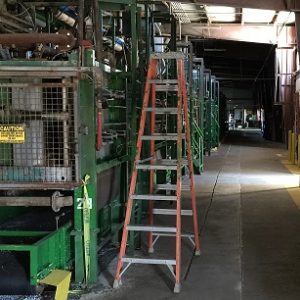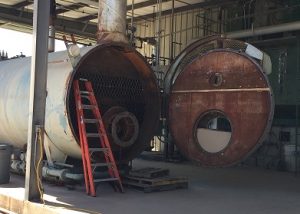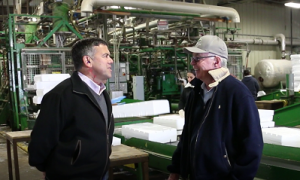After two years of unrelenting decline and $6M in losses, the owners of Styrotek, a packaging manufacturer for table grapes decided they needed to bring in outside help to turn things around.
Styrotek was founded in 1973 by a group of grape growers who came together to produce boxes for their farming operations in the central valley of California. While manufacturing was not originally in the company DNA, the business got to the point of creating a consistent product and quickly grew along with the grape industry.
That was until 2014 when things started to go sideways. “The company was somewhat in disarray,” Chris Caratan, one of the owner’s of Styrotek said. “Our management team at the time was not working up to par and there were some surprises in year-end numbers.”
By 2015 the company was in dire straits. They had gone from an anticipated profit to a multi-million dollar loss. There were problems with everything from bookkeeping to operations. When the company attempted to ramp up for the grape season, issues with several processes and broken machinery led to a plant shut down. They were at a complete standstill.

“We knew we needed to make a change,” Chris said. “We couldn’t continue to operate the way things were going at the time. I knew I didn’t have the skills needed to make that change and once I recognized that, I knew we had to look outside to find someone who had those skills.”
As Chris began to search for a lifeline he came across InterimExecs’ Rapid Executive Deployment Program, which matches companies with interim executive talent. After a call to assess Styrotek’s situation, InterimExecs introduced the company to Dick Lindenmuth, a veteran interim executive with operational experience across a wide range of industries.
After a phone conversation, Styrotek decided to move forward and Dick agreed to take on the assignment. “We had a great feeling right from the start,” Chris said. “Dick is a capable, steady hand. Based on his background we felt he was more than capable to take on the assignment, and we were relieved that we felt we had someone who was up to the task of turning us around.”

Dick, like many interim executives began with an assessment of the company. This allowed him to get a full picture of the situation, lay out a plan and make sure everyone was on the same page moving forward, and set expectations as to additional expertise or money needed to complete the turnaround.
“It’s never clear from the start,” Dick said. “The people who are involved as owners and investors are not necessarily in touch with day-to-day operations, so you are getting background that may not be consistent with what your initial expectations were walking in.”
For Styrotek, Dick realized that he instantly had to set up good communications with buyers to line up orders, which he would have to deliver within weeks when grape season started. “If Styrotek couldn’t deliver in 8 weeks, they were already behind the curve,” he said.
After assessing the company, Dick set out milestones to be achieved as Interim CEO and presented them to the board:
• Return company to manufacturing before the harvest
• Return company to profits and positive cash flow
• Eliminate water waste
• Increase production, increase quality, reduce overhead, reduce product cost
Styrotek’s family owners met to discuss Dick’s recommendations and the investment they were making in an Interim CEO. “It’s not an inexpensive hire,” Chris said, “but we felt it was worth it given the level of problems we had uncovered that needed someone of high caliber. We trusted that it would end up paying for itself.”
The family gave the green light to move forward. Chris said from the start it was amazing. Dick took the reins and progress was made within the first few months. “It was impressive the amount of work he was able to get done and the amount of leadership that had been lacking from our previous management that he brought to the table,” Chris said.
Dick says in each interim assignment the recipe for success begins with communication. He usually sees some “FUD” (Fear, Uncertainty, and Doubts) among the team and management, however, once some small, timely changes begin to be made, the FUD factor dissipates.

“An interim does not ‘tell’ people what is going to be done,” Lindenmuth said. “They ask people what they see that represents areas of concern. Many of the people have been doing these things for years. They may not have the perfect answer, but they have been watching and see what is successful.”
Dick immediately went to work to bring in outside resources, including filters on flatbed trailers to make sure the water was acceptable to the boiler, which at the time was strewn in pieces on the factory floor. He then encouraged the internal team to tackle issues around setting up production, testing quality levels of their resins and chemicals, fixing machinery, and laying out cost and a plan of action to meet the 8-week deadline.
“He believed that the expertise was already here, but that people at the top level were not listening,” explained Victor Adan Velazquez, Production Manager of Styrotek.
As an interim, Dick also sees the importance of instant recognition. “Raw talent is overrated!” he says. “Average people provide excellent results when recognized and supported.”
These moves produced results for Styrotek:
• Highest daily/weekly production volume in company history
• Product costs reduced by 20% and continuing to improve
• Initiated capital investment program to repair, upgrade machines/molds
• Put in new water well, and now recycle water with zero waste water
• Reduced overhead by 31%
• Established first preventative maintenance program for plant and equipment
• Increased prices and decreased delivery costs
From substantial losses in 2014 and 2015, the company became profitable within 12 weeks of Dick coming on board. “We were back and still had a viable business, and we’re looking at how we could grow it into the future,” Chris said.
Not only did Dick get operations up and running, but the culture within Styrotek began to transform. More cooperation, more quality versus quantity-driven permeated throughout the whole company.
Today Chris says the employees feel more secure, have the leadership they were lacking and have confidence in where the company is going. “Sometimes, bringing someone in who has been in those situations before can really help make significant change to the positive in a very short period of time.”
While Chris admits that the fees were not small, he says “the company has been profitable and the long-term investment they have made and the potential for new markets are close-at-hand. I think the investment from this point in time has proved to be paid back and then some.”





